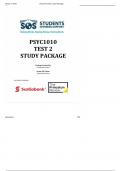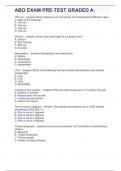Exam (elaborations)
PSYC1010 TEST 2 STUDY PACKAGE WITH GUIDELINES AND APPROPRIATE ELABORATIONS
- Course
- Institution
Respondent behaviour: behaviour that happens as an automatic response to some stimulus Unconditioned stimulus (US): something (in Pavlov’s study, food) that naturally and automatically triggers an unconditioned response Unconditioned response (UR): this is an unlearned and naturally o...
[Show more]




